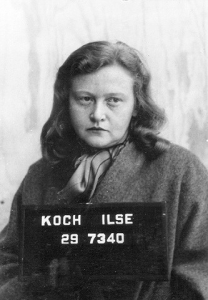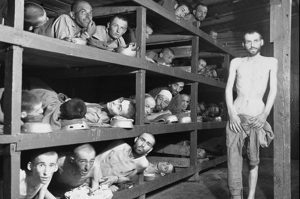buchenwald
 On April 11, 1945, the American Third Army liberated the Buchenwald concentration camp, near Weimar, Germany. Buchenwald was a camp that will be judged second only to Auschwitz in the horrors it imposed on its prisoners, but on this day in 1945, those horrors came to an end. The camp held thousands of prisoners, mostly slave laborers, many of whom were required to work 15 hour days. There were no gas chambers at Buchenwald, but hundreds, and sometimes thousands of prisoners, died every month from disease, malnutrition, beatings, and executions. Doctors performed medical experiments on inmates, testing the effects of viral infections and vaccines. Beginning in 1941, a number of physicians and scientists carried out a varied program of medical experimentation on prisoners at Buchenwald in special barracks in the northern part of the main camp. Medical experiments aimed at testing the efficacy of vaccines and treatments against contagious diseases such as typhus, typhoid, cholera, and diphtheria resulted in hundreds of deaths. The people these doctors were experimenting on were considered, non-human, and so their lives, or the loss thereof, were of little or no consequence to these evil doctors and scientists.
On April 11, 1945, the American Third Army liberated the Buchenwald concentration camp, near Weimar, Germany. Buchenwald was a camp that will be judged second only to Auschwitz in the horrors it imposed on its prisoners, but on this day in 1945, those horrors came to an end. The camp held thousands of prisoners, mostly slave laborers, many of whom were required to work 15 hour days. There were no gas chambers at Buchenwald, but hundreds, and sometimes thousands of prisoners, died every month from disease, malnutrition, beatings, and executions. Doctors performed medical experiments on inmates, testing the effects of viral infections and vaccines. Beginning in 1941, a number of physicians and scientists carried out a varied program of medical experimentation on prisoners at Buchenwald in special barracks in the northern part of the main camp. Medical experiments aimed at testing the efficacy of vaccines and treatments against contagious diseases such as typhus, typhoid, cholera, and diphtheria resulted in hundreds of deaths. The people these doctors were experimenting on were considered, non-human, and so their lives, or the loss thereof, were of little or no consequence to these evil doctors and scientists.
Among the camp’s most gruesome characters was Ilse Koch, wife of the camp commandant, who was infamous for her sadism. Her cruelty and heinous acts earned her the nickname, The Witch of Buchenwald. She often beat prisoners with a riding crop, and collected lampshades, book covers, and gloves made from the skin of camp victims. She was always in attendance when new prisoners were brought in. She required that they be stripped so she could examine their skin. When she found something she liked, the prisoner was killed and their skin removed for her to use. Koch was truly an evil person, and in the end, I think it all came back to haunt her, because after she was tried for a second time and given a life sentence she hanged herself at Aichach women’s prison on September 1, 1967. She was 60 years old. She was said to suffer from delusions and had become convinced that concentration camp survivors would abuse her in her cell. I think her evil ways drove her insane.
As American forces closed in on the Nazi concentration camp at Buchenwald, on April 11, 1945, Gestapo headquarters at Weimar telephoned the camp administration to announce that it was sending explosives to blow up any evidence of the camp…including its inmates. What the Gestapo did not know was that the camp administrators had already fled in fear of the Allies. A prisoner answered the phone and informed headquarters  that explosives would not be needed, as the camp had already been blown up, which, of course, was not true. That act of quick thinking, saved countless lives. The sights the Allied troops saw as they entered the camps must have been sickening. People emaciated due to starvation, the smell of death everywhere, the signs of the horrific experiments that took place there. This place should never have been allowed to exist, and yet here it was. The prisoners who had managed to survive were most likely staring in stunned disbelief, not quite able to believe their eyes. Nevertheless, they had survived and they were liberated. Among those saved by the Americans was Elie Wiesel, who would go on to win the Nobel Peace Prize in 1986.
that explosives would not be needed, as the camp had already been blown up, which, of course, was not true. That act of quick thinking, saved countless lives. The sights the Allied troops saw as they entered the camps must have been sickening. People emaciated due to starvation, the smell of death everywhere, the signs of the horrific experiments that took place there. This place should never have been allowed to exist, and yet here it was. The prisoners who had managed to survive were most likely staring in stunned disbelief, not quite able to believe their eyes. Nevertheless, they had survived and they were liberated. Among those saved by the Americans was Elie Wiesel, who would go on to win the Nobel Peace Prize in 1986.

